- Home
- M. D. Lachlan
Wolfsangel c-1 Page 20
Wolfsangel c-1 Read online
Page 20
He struggled to hold his breath. Dread overwhelmed him, he felt that he was drowning in fear as much as water. The bonds would not come off, the weight on his back and on his legs felt immense, almost part of him, as if he were some enormous giant too heavy to lift itself.
He couldn’t get the ropes off, couldn’t get free. Vali tried to remember that he had chosen to be here, that he wanted this, but it was no good. An instinct, animal and undeniable, rose up in him and he fought for the surface. He opened his eyes to look for the light and could see no more in the muddy waters than when they were closed. Then his will burst and he breathed in. He spat and coughed and then felt his throat clench shut. He had the desire to move his body but he could no longer do so, though he was kicking with his mind. His longing for the air seemed like something trapped in his head, thumping to get free. Still he struggled, the panic swamping even the emotions of despair.
Then, as suddenly as it had come on, the terror was gone and he felt peaceful, as if any cares he had, any frustrations and fears, were just silly things, almost incomprehensible under the calm that came down on him like a parent’s kiss on a sleepy child.
Light. And noise, hard blows and a sensation of movement. The grass felt cold. Someone was slapping him across the back of the head. He tried to defend himself but his hands were tied. A face came into focus. It was Jodis.
‘Nothing?’ she said.
Vali coughed, spluttering out water and mucus from his nose and mouth.
‘Nothing.’
‘Do you need a rest?’
Vali thought of Adisla, of what she would be enduring on the Danes’ drakkar. ‘No rest,’ he said. He could hardly get the words out. His throat was dry and sore from where it had constricted in the water and his muscles writhed on his bones in a deep shiver.
‘Put him back,’ said Jodis.
Time became flexible to Vali, a malleable thing, like a piece of hide to be stretched or shrunk, a smith’s ingot heated and cooled, bent and straightened. When he was in the water every heartbeat seemed a year. When he was out the sun seemed to dip and rise like a skimmed stone. Even though his will was strong, Vali couldn’t help but take rests. At first they untied him when he did so. Eventually they did not. He could say, ‘Put me back in the water,’ but he couldn’t make his body allow it, and the more times he went in, the harder he struggled. At first he could control himself until he reached the centre of the mire. After a day he began to fight as they led him to the edge. It was a place of horror to him now, though no visions came, no insight or revelation, just the awful black water closing in on him, the pressures from within as the air struggled to burst from his lungs, and without as the water rushed to get in. A weighty black mass seemed to pull at his brain, heavier on the left than the right, the asymmetry giving him a headache like he had never known. His throat was raw and he could hardly speak.
There was no crowd there to see the magic. The Danes had gone and the Rygir were at home, sitting in groups remembering the dead, tending the wounded or just keeping their children close and the door shut. Adisla was the only one taken but ten others had died and still more were wounded. People drank, though not in celebration, hoping to damp down the misery and accentuate the glory of the violent day. Only Jodis’s children and Bragi came to watch Vali suffer.
Jodis sent her girl away to bring soup, but Vali couldn’t drink it. His throat had clamped shut, so he shivered out the interludes between his ordeals starving and cold. On the first day he managed twelve trips to the water. On the second he did four. The third day, lack of sleep blunting the reality of what he was doing, he managed eight. And, towards the evening, he did begin to see.
Drowning beneath the dark waters, he was somewhere else other than the mire, somewhere equally cold but not wet or dark. At that turning point, the moment between the panic and the calm of drowning, he was in a confined space, a tunnel that seemed to glow, the rocks emitting a soft and alien light. Someone was there, he was sure, though he couldn’t say who. He could feel their presence as a tone, a mood or a pattern of thought. He had never known anything like it. It was a mind that seemed like a river — always moving, always the same — and, like a river, it had currents that might drag you down.
And when he was lifted from the water, he didn’t see Orri and Hogni but that strange red-haired man in the cloak of hawk feathers, taking him up and out into the clean cold air. He heard a voice that seemed familiar.
‘Give yourself completely.’ Then the man was gone and Vali could stand it no more. He knew what was required. You cannot go to the gates of death if you are still looking back at life. He needed to step forward boldly. The idea didn’t come to him in words but as a feeling of want, like a prisoner wants freedom. He was fettered by something and the fetters needed to break.
The men pulled him up and he lay back in their arms, limp as pondweed.
‘Lord,’ said Orri, ‘you have tried. There is nothing there for you.’
‘No,’ said Vali, though the word was more of a cough than anything understandable. The men started towards the bank.
‘No.’
They stopped.
‘What, lord?’
Vali made himself speak, forcing his aching lungs to expel the air through the constriction of his throat to frame the words. He was weak and tired and he needed to end this suffering whatever the cost. From behind the hillside, towards the sea, there came the sound of horns and a clamour. Forkbeard was returning. It meant nothing to Vali.
‘Do not pull me out,’ he said.
‘You mean to die?’
‘The water,’ said Vali, pointing into the mire. He was beyond explanation. The sky was a cave, black with rain, the light unnatural, a subterranean glow, like that tunnel. His senses seemed muted and dull, as if the darkness of the mire still clung to him.
‘You are raving, lord,’ said Hogni. ‘Ma Jodis, the prince says we are to put him in again.’
Jodis tapped the ground with her foot in thought. She looked back over her shoulder in the direction of the sea, thinking of the girl on the Danish ship. Of course, the prince would be taken out of the mire but perhaps it was time to give it longer. Much longer.
‘Do as he says,’ she said.
Now it was Hogni and Orri who hesitated, but Vali took the decision from their hands. With the last of his strength he kicked his feet away from under him and cast himself back into the water.
22
Magical Thinking
The witch queen was working on the Moonsword when she realised that the sorcerer had found Vali. She had taken Authun’s weapon on an impulse, not a whim like an ordinary human might have but in response to a magical feeling. She knew it was important and, in the years since the king had come to the cave, she had realised how. The wolf would kill Odin but then it would need to die. Ancient prophecy was clear on how this would happen. Odin would fall, and then another, kinder, more humane god would kill the wolf. If the pre-echo of that conflict really was to be played out in her lifetime then that god would need a weapon. The wolf could not be killed by any normal blade, otherwise it would not be able to defeat the king of gods in battle. So the sword would need to be enchanted.
In the lower caves there was a narrow wedge of rock where the jagged ceiling met an uneven floor. She had always thought it looked like the jaws of a wolf. Now she wedged the sword into it, as the sword was wedged into the jaws of the Fenris Wolf, and for months she concentrated on seeing it as something that could harm the savage god.
The witch was so strong in magic that she was half a god herself, and her perceptions were not like those of humans, things that flicker into being for an instant and then cease to exist when attention shifts. They were more like living things, spider thoughts that crawled from the egg of her mind over the object of her meditation — the sword — and waited to ensnare whatever encountered the weapon in future. She convinced herself that the weapon would kill the wolf, and the sisters sat with her, sharing that belief. At the
end of their period of meditation that idea had entered the Moonsword and would warp the perceptions of all who encountered it in future, including the wolf himself.
Gullveig knew that anything that could defeat Odin would not be killed by a lesser magic, and all magics were less than that possessed by the king of gods, but she saw one hope. The prince, she knew, had been raised on tales of his father’s battles and had grown up hearing stories of the magical lost sword. When he was eaten by the wolf, his consciousness would mingle with his brother’s. That, she believed, provided the key to the wolf’s death. The magic would not need to batter down the wolf’s defences; it would enter through a crack provided by the man who had given his life to bring the Fenris Wolf to earth.
The meditation was finishing when the witches felt a brief pause in the flow of things, like someone sleeping in a cart might suddenly become aware that it had stopped. Vali, in the mire, had stepped into the magic space of visions and prophecy where the witches lived, and it was as if they had heard his footfalls at its threshold.
The witch queen was aware of someone else too. She heard chanting and drums and saw the eyes of the sorcerer. Then she felt the delicious pull of cold waters, felt her throat constricting, the desperation for air, a thick despair in her head, and she fell into Vali’s mind.
She had known before that male magic was weak. The rituals that the wolf shaman Kveld Ulf practised, for instance, could influence the physical realm but were scarcely recognisable as magic at all to the sisters of the Troll Wall. They were performed without the aid or understanding of the runes and to the witch queen were as strong as a house built without foundations. The blue-eyed sorcerer’s presence was almost fragile to her.
She saw images pulsing from his drum, running wolves, reindeer, bears, all moving from the skin as little stick figures, dancing their way into the mire. What was he trying to do? She allowed herself to sink into the rhythm of the drum, turning it over in her head. After a time she understood it, owned it. The rhythm was hers to command now. The sorcerer was concentrating too much on the man in the mire and didn’t realise she was there, that the beat coming from his drum had been altered and was spilling his secrets into the web of the witch queen’s mind. His thoughts fell open to her. He had been seeking the twin who had become a prince, had insight into his importance but had no real idea how to proceed, she could tell.
The witch queen was pleased. She had her enemy at her mercy, distracted, not aware of her, his limited magic ensnared in an attempt to influence the young man in the mire. She felt the runes rising in her as a sharp thorn to prick him with, fire to burn him, ice to freeze him, water or earth to stop up his breath.
In the darkness of her cave she felt a hand take hers. She turned in the weak glow of a whale-fat candle to see a woman with a ruined face sitting beside her, smiling. Then a realisation came to the witch’s mind and she forgot her odd companion.
The witch knew that the sorcerer, no matter how weak he appeared, was the god Odin. Therefore any vulnerability he expressed was a strength in disguise. She might attack him but he would survive, and, in surviving, he might realise who he was, awake to his powers and crush her.
The candle guttered and the shadows seemed to stretch across her sight as she sensed her murder-minded ancestors looking at her from the rocks around her. In their sudden presence was a message, she knew.
Magical thinking can appear close to insanity but, like some forms of insanity, it has aspects of genius. The first witches had known Odin had taken up female magic. He alone among men was a master of the women’s art — Seid, as it was called. Loki had told Gullveig that the god was lore-jealous, that he was striking at her because she had become too wise in magic. So the god hated powerful sorcerers in the earthly realm and would come to kill them. Very good, she thought. Then, if the god himself came to the earthly realm and was made to recognise himself as the most powerful sorcerer, he would strike at himself. The god could be tricked into killing his own incarnation. Odin was known as the all-hater. Would he exempt himself from that hate? No.
She would help the sorcerer, strengthen him and weaken herself, and in so doing she would shrink from the notice of the dead god and make him focus his attention on his own earthly self. He had seen enough to embark on that path anyway, she could tell. His visions had shown him the wolf and the boys and now he was trying to summon the creature to be his protector. He was using the girl. The Wolfsangel showed the witch that the healer’s girl was bound to the brothers and to their eventual transformation. So Gullveig’s enemy had nearly everything in place to summon the wolf. And yet, without her help, he would never do it.
The death of the girls in the Witch Caves had not been an attack. It had been a sort of prophecy, guidance, even perhaps a manifestation of her own magic, telling her what to do. The keys to magic, the witches had always known, were pain and shock. Now she saw the key to survival was weakness. She would diminish the power of her sisterhood, bolster that of her enemy and help him perform the magic that would destroy him. She had thought that she would call the wolf to destroy the god. Now she knew better. The god could call the wolf himself.
The sorcerer had achieved a great deal without the runes. With them, she thought, he would rush to his fate. Gullveig decided, she would send her enemy a gift.
One of the older sisters, the one who held the rune that shone like a lamp in the dark and brought insight and clarity to the witches’ visions, was dying, lying in the upper caves. Her inheritor was at her feet, deep in the trance that would enable her to receive the rune. That, thought Gullveig, could not happen.
Disa had been right about magic. A spell is not a recipe as such, though many have their ingredients, their methods of mixing and baking in the dark oven of the mind. It is more like a puzzle, where constituent parts must first be identified and then assembled into a whole, or even like embroidery, but formed from pain and denial rather than needle and thread.
At its higher reaches magic is a matter of feel. The witch queen, who had trained her instincts in years in the dark, knew that cold thought yielded nothing in sorcery. The way to achieve what she wanted was simply to begin, to take those invisible threads in her hands — the one called agony, the one called despair — and weave them into something more than the sum of their parts.
As she allowed herself to fall into a trance, Gullveig thought of the dying witch and her breathing became shallow, her limbs feeling weak in sympathy. Rot was in the witch queen’s mind — disease, the burst corpses of fever victims, the stink on the breath of old women dying. The smell seemed to cling to the witch queen and she knew that the old witch’s was a rightful death, a fine and beautiful thing.
The witch queen walked with the woman through her deathbed memories. She saw how the old witch had been brought to the caves as a girl, felt her fear of the darkness, her anguish as she was trained and her elation as the rune finally lit up in her and bonded her fast to her sisters. She sensed the other witches too, spectral presences in the old woman’s mind, and she went to them, telling them it was time to leave and to bid their sister goodbye. The witches melted away and the queen felt the dying woman’s thoughts shrivelling in on themselves. When the sisters were gone, Gullveig sat with her in the dimness of her mind. Her rune was shining in the murk like a lantern.
Gullveig took it and the witch died. She saw the girl who was to receive it waiting in the dark. In her trance, the witch queen held up her hand and the girl fell dead. Then she returned to Vali in the mire and sent it spinning towards the sorcerer.
She heard a cry, heard the rhythm of the drums falter as the rune entered him. The witch smiled to herself. Now he would have insight and clarity like he had never had before. He would understand what to do when she sent him the next rune. She took out her small piece of leather, ran her thumb around the outline of the Wolfsangel rune. The sorcerer could sense her now, she could tell. She thought of the Wolfsangel and opened her consciousness like a deadly flower, exposing the da
rk nectar of the rune within. Something reached hungrily into her head, tearing and ripping. The witch fought to stop herself retaliating, to keep her defences down. Her eyes felt as though they would burst as the sorcerer’s drumbeat seemed to chisel the rune from inside her. She fell forward, bleeding at the nose and at the mouth, biting at her fingers to try to distract herself from the pain in her head. She felt her enemy’s exultation and agony as the rune wound its tendrils into his mind. The witch was satisfied. The god’s manifestation was on the way to where he needed to be to destroy himself. Now he really could call the wolf, which meant he would die. She withdrew from her trance and shivered.
The experience of having killed one of her own buzzed through her mind like an angry wasp through a summer’s day. She had stepped deeper into insanity but even that felt right. She got up to go to her dead sister. She would sit with her a while, she thought. It would be useful to confront what she had done, feel its impact, stroke the old witch’s hair, stay with her in the darkness while she rotted. Murder, regret and grief were tools she could work with to dig new tunnels through the labyrinth of her magical mind.
She stood, not noticing the hand that helped her to her feet.
23
Running Wolf
To Vali, the panic seemed dimmer this time, smudged by tiredness. His endurance was gone and he breathed in, then felt the clamping of his throat, the involuntary spasm of the muscles as he tried to propel himself to the surface. He tried to relax, to let what had to happen, happen. Then the fear fell away from him, disappearing like a ballast stone dropped from a ship.
‘He’s still,’ said Hogni.
Orri just shook his head and looked down. The rain had set in properly, unrelenting sheets sweeping off the ocean. The whole world seemed made of water, the mire and the hillside that held it just smears of grey against a storm-black sky.

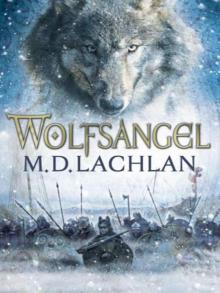 Wolfsangel
Wolfsangel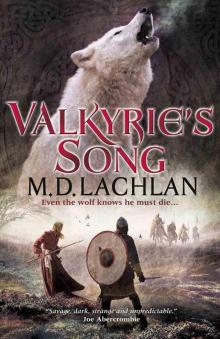 Valkyrie's Song
Valkyrie's Song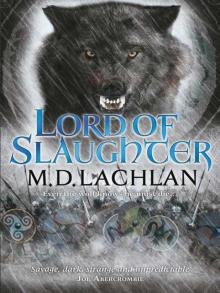 Lord of Slaughter
Lord of Slaughter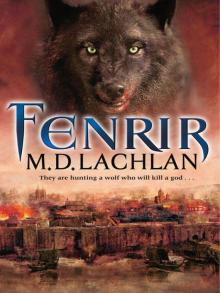 Fenrir c-2
Fenrir c-2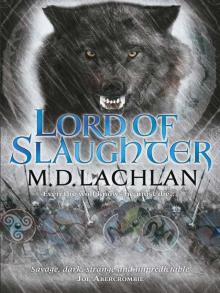 Lord of Slaughter (Claw Trilogy 3)
Lord of Slaughter (Claw Trilogy 3)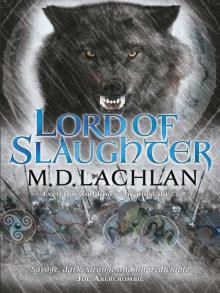 Lord of Slaughter c-3
Lord of Slaughter c-3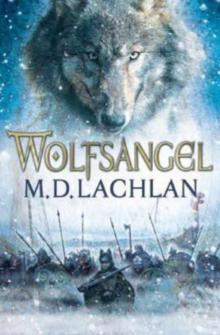 Wolfsangel c-1
Wolfsangel c-1